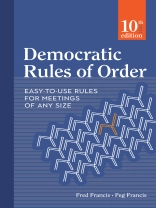Revolutionize meetings! Over 20, 000 copies sold – the easy-to-use guide for running democratic meetings of any size
The key to promoting true democracy in meetings is clear, easy-to-understand rules of order that support the right of each member to participate fully and equally, and the right of the majority to make decisions while respecting minority rights.
An alternative to Robert’s Rules of Order and other complicated and unwieldy guides, Democratic Rules of Order is the guide for the rest of us. It lays out clear, concise, easy-to-use rules for governing meetings from clubs and non profits to formal meetings. Benefits include:
- A complete set of laws for governing meetings
- Can be read in an hour
- Plain language, free of complex protocol and jargon to enable equal and efficient participation
- Tested and honed through thousands of successful meetings
- Adoptable as the official rules of order for meetings of any size
- Allows informality, including decisions by consensus, but ensures formality when needed
- A sample meeting that uses all the rules plus answers to 31 common questions.
Now in its tenth edition, and with over 20, 000 copies sold, Democratic Rules of Order will produce fair, efficient, and harmonious decisions in meetings of any size or complexity.
Inhaltsverzeichnis
Foreword by Douglas Leiterman
Preface
Part 1: The Rules
Introduction
Fairness and Orderliness
Democratic Principles
A Democratic Ideal
Another Democratic Ideal
Degrees of Formality
Higher Laws
Minority Rights
For Maximum Efficiency
The Tenth Edition
Virtual Meetings
To Adopt or Modify These Rules of Order
An Impersonal Referee
Governing Elements
Government Control
Constitution
Bylaws
Standing Rules
Rules of Order
Executive Board
Officers
Election Procedures
Members Making Decisions
Final Authority
Equal Rights
The Chair
Chair’s Authority
Formal Chair
Informal Chair
Addressing the Chair
Quorum
Agenda
Motions and Decisions
Mover’s Privilege
Amendments
Postpone, Refer
Voting
Tie Vote
Larger Majority Vote
Informal Discussion
Rescind
Reconsider
Minutes
Reports
Ratifying a Previous Decision
Adjournment
Keeping Meetings Flowing
Staying on the Subject
More Thought, Less Talk
Mutual Respect
Point of Order
Disturbances
Differing Opinions
A New Chair
Committees and Small Meetings
Committees
Less Formality
Special Committees
Chairing a Committee Meeting
Nondemocratic Meetings
Part 2: Further Help
Frequently Asked Questions
Involving the Chair
Involving the Secretary
Motions and Other Topics
Sample Meeting
Flowchart Using Democratic Rules of Order
Summary of the Rules
Index
About the Authors
A Note about the Publisher
Über den Autor
The late Fred Francis, and his wife Peg Francis, had decades of experience with meetings in school, college, business, church, and community organizations as members and as officers. Seeing the urgent need for stronger democracies, they brought their skills as former educators to bear to create a set of easy-to-use and widely applicable rules for governing democratic meetings. He lived in Victoria, Canada.












